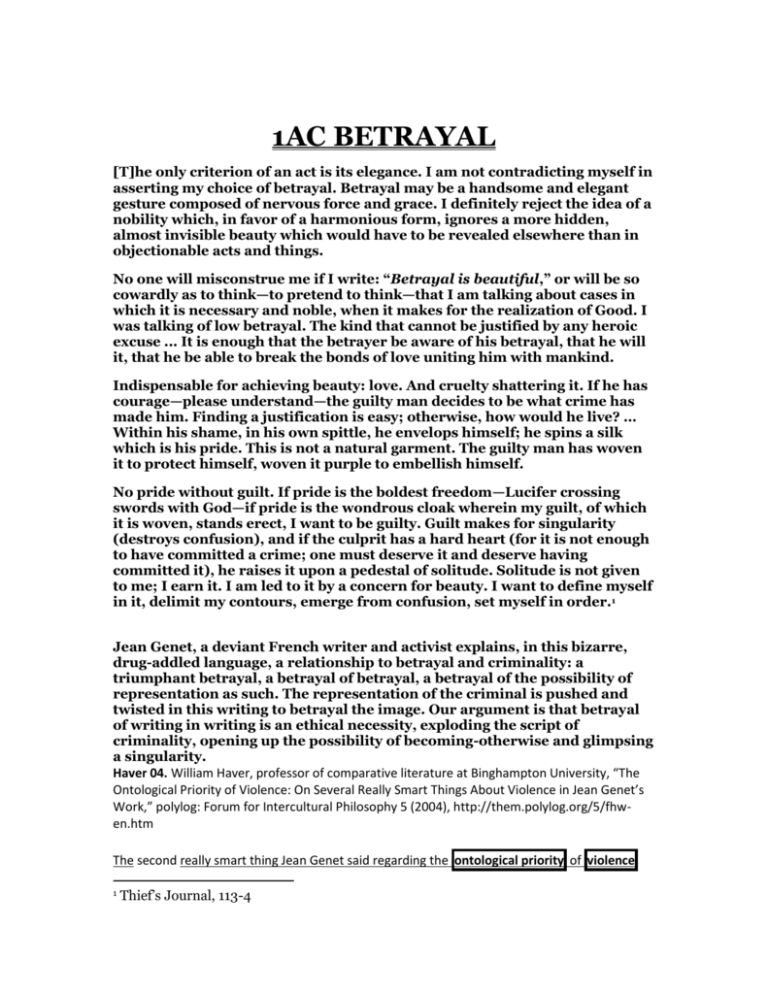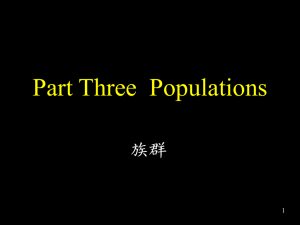1AC Betrayal
advertisement

1AC BETRAYAL [T]he only criterion of an act is its elegance. I am not contradicting myself in asserting my choice of betrayal. Betrayal may be a handsome and elegant gesture composed of nervous force and grace. I definitely reject the idea of a nobility which, in favor of a harmonious form, ignores a more hidden, almost invisible beauty which would have to be revealed elsewhere than in objectionable acts and things. No one will misconstrue me if I write: “Betrayal is beautiful,” or will be so cowardly as to think—to pretend to think—that I am talking about cases in which it is necessary and noble, when it makes for the realization of Good. I was talking of low betrayal. The kind that cannot be justified by any heroic excuse ... It is enough that the betrayer be aware of his betrayal, that he will it, that he be able to break the bonds of love uniting him with mankind. Indispensable for achieving beauty: love. And cruelty shattering it. If he has courage—please understand—the guilty man decides to be what crime has made him. Finding a justification is easy; otherwise, how would he live? … Within his shame, in his own spittle, he envelops himself; he spins a silk which is his pride. This is not a natural garment. The guilty man has woven it to protect himself, woven it purple to embellish himself. No pride without guilt. If pride is the boldest freedom—Lucifer crossing swords with God—if pride is the wondrous cloak wherein my guilt, of which it is woven, stands erect, I want to be guilty. Guilt makes for singularity (destroys confusion), and if the culprit has a hard heart (for it is not enough to have committed a crime; one must deserve it and deserve having committed it), he raises it upon a pedestal of solitude. Solitude is not given to me; I earn it. I am led to it by a concern for beauty. I want to define myself in it, delimit my contours, emerge from confusion, set myself in order.1 Jean Genet, a deviant French writer and activist explains, in this bizarre, drug-addled language, a relationship to betrayal and criminality: a triumphant betrayal, a betrayal of betrayal, a betrayal of the possibility of representation as such. The representation of the criminal is pushed and twisted in this writing to betrayal the image. Our argument is that betrayal of writing in writing is an ethical necessity, exploding the script of criminality, opening up the possibility of becoming-otherwise and glimpsing a singularity. Haver 04. William Haver, professor of comparative literature at Binghampton University, “The Ontological Priority of Violence: On Several Really Smart Things About Violence in Jean Genet’s Work,” polylog: Forum for Intercultural Philosophy 5 (2004), http://them.polylog.org/5/fhwen.htm The second really smart thing Jean Genet said regarding the ontological priority of violence 1 Thief’s Journal, 113-4 consists of a constant meditation , traversing all his work, on the solitude of things . Of the hundreds of possible citations, let me select, to begin, just this, from The Thief's Journal: [T]he mere appearance of things must have caused me that anxiety which at first was born of fear . Then the anxiety disappeared. I felt I was perceiving things with blinding lucidity . Even the most trivial of them had lost their usual meaning , and I reached the point of wondering whether it was true that one drank from a glass or put on a shoe. As I discovered the particular meaning of each thing, the idea of number deserted me. […] I think I remember having the revelation of an absolute perception as I considered, in the state of luxurious detachment of which I have been speaking, a clothespin left behind on a line . The elegance and oddness of this familiar little object appeared before me without astonishing me. I perceived events themselves in their autonomy . The reader can imagine how dangerous such an attitude must have been in the life I was leading [as a thief], when I had to be wide-awake every minute and ran the risk of being caught if I lost sight of the usual meaning of objects. (Genet 1964, 129-130) Commentary on this and nearly identical passages in Genet could go on forever; I will limit myself to four observations. First, that in the blinding lucidity of this seeing , things exceed their instrumentality , and to the extent that they do so, they lose their meaning (signification) as well as – but it is the same thing – their relation to other things ; in this » absolute perception « (connaisance absolue, rather than any savoir), in this revelation, the disposition of things is entropic, coming to rest in the solitude of an absolute luminescence. In their singularity , things cannot be subsumed within any generality or universality ; they therefore cannot be counted , and thus render the very idea of number incomprehensible (for, with Borges, Nancy, Deleuze and Guattari, and quite a number of others, we could only »count« singularities as »1, 1, 1, 1…« but then »one« could no longer be a number [for what is one without 2, 3, 4?] ). In their singularity , things are neither individual nor particular ; they are incommensurable in their entropic solitude , and thus never coalesce into what might be called a »world.« Which threatens , in an essential way, the comportments , practices , and gestures that constitute the thief's subjectivity ; this seeing is not the faculty of a subject. As Genet was to tell Hubert Fichte years later à propos works of art, »I more and more lose the feeling of being ›me‹ [moi], the feeling of ›I‹ [je] as anything other than the perception of a work of art.« (Genet 1991a, 146) Finally, the solitude of things is neither a matter of astonishment nor of enchantment ; this is neither enlightenment nor magical realism. And if this constitutes a fetishism , it is quite contradictorily a disenchanted fetishism (sometimes called materialism , of course). The luminescent entropy of the solitude of things , the disenchanted fetishism of this materiality – in short, this singularity – is at once always already accomplished at the same time that it is always yet to come , and yet neither precedes nor survives its articulation. It is always a process of disenchantment , of an approach to absolute solitude , of a tendency toward entropy , a process (which perhaps amounts to a practice) of becoming-singular , becoming-nothing-but-thing , of becoming-nontranscendent . It is a kind of k_nosis (a kind of becoming-stupid , as Ronell has recently reminded us; Ronell 2002, 178-185) in a certain abjectification , a becoming-destitute or desperate , constant themes of Genet's writing. Indeed, the quotation with which I began is preceded by a passage that is not merely existential psychology: In short, the greater my guilt in your eyes , the more whole , the more totally assumed , the greater will be my freedom . The more perfect my solitude and uniqueness . By my guilt I further gained the right to intelligence . Too many people think, I said to myself, who don't have the right to . They have not paid for it by the kind of undertaking which makes thinking indispensable to your salvation . (Genet 1964, 84) Here, guilt is the figure of that non-transcendence , non-neutrality , which alone vouchsafes the right to think . Evil , betrayal , crime , treason , the themes of more than the novels and plays, are all becomings , all trajectories of separation , passages of dissociation , flights from relationality , acts of more than metaphysical violence . All of these negations of relation , these non-relations , these anti-relations , are themselves relations . The constitutive – creative – relation in Genet is the violence of separation . At Mettray, the reformatory where Genet spent much of his adolescence and which preoccupies him throughout Miracle of the Rose, the only relation among the inmates are violent, erotic, and therefore social relations. And in his last, avowedly post-literary work, Prisoner of Love, he recalls attending mass at the abbey of Monserrat: Then came the famous kiss of peace: after the elevation the Abbot kissed each of the acolytes on both cheeks, and they conveyed the salutation to each of the monks sitting in the choir. Then two choristers opened the screen doors and his reverence came down among the congregation, kissing some of us. I was one of those who received a kiss, but I broke the chain of fraternity by not passing it on. (Genet 1992, 33) This thought of violent separation in betrayal , treason , crime , k_nosis , abjection , guilt , evil , desperation , and disenchanted fetishism is a thought of becoming-thing , of entropy : in short, at once an empiricism and a materialism . And let me repeat that this violent becoming is neither the realization of a possibility (because it is always already realized ), nor is it ever accomplished in any teleology ; it is a becoming with neither ground nor telos , which nevertheless happens . If this thought of singularity is important for Genet , it is because it bears with it , equiprimordially as it were, a thought of multiplicity , a thought of sociality as the infinite proliferation of differences . But I have oversimplified; things are essentially more complicated than that. Dominance and criminal deviance are situated in a violent dialectic, one that imposes identity onto the deviant, enclosing the body within a grid of intelligibility. We follow Genet, a betrayal of ourselves as writers and speakers, we betraying our “true selves” contrary to the effervescent norm – we are a perverse, parodic form – we are the inversion of the dialectic, a cultural tactic of forcing the forefronting of the void as we affirm the perverse inauthenticity of identity as such Dollimore 86. Jonathan Dollimore, professor of English at the University of York, “The Dominant and the Deviant: A Violent Dialectic,” Volume 28, Issues 1-2, pg. 189 As a style, and even more as a politics, inversion has proved controversial , especially when grounded in the celebration of a perverse inauthenticity and the subversion of its opposite, authentic subjectivity. Take the case of Genet . Kate Millett” finds that his deviants reproduce in inverted form the structures of dominant heterosexuality , especially its masculine component . Thus inverted, these structures are shorn of their ideological legitimation; in effect the world of normality beyond which Genet lives in exile is ridiculed and contradicted in the very process of being imitated. Genet’s femininity for instance ’is, as Sartre phrases it, a ’hostile eroticism’, delighted to ridicule and betray the very myth of virility it pretends to serve’ (pp. 18, 349). Genet appears for Millet ’the only living male writer of first class literary gifts to have transcended the sexual myths of our era’ (p. 22). Conversely, for Hans Mayer’” Genet‘s commitment to inversion makes him deeply conservative: ’Genet’s books are the exact opposite of a literature of indignation and rebellion. The author has no intention of making accusations or unmasking society. He is a true believer in the bourgeois order, not a critic.’ More hostile still are those like Walter Heist who conclude that Genet is pervaded with fascism (cited by Mayer, p. 225, who dissents from the view). The disagreement is both political and aesthetic , these things being indissociable , and it returns us to Hassan’s fierce dialectic between margins and centre , and certain pressing questions : who wins : what changes ? There’s currently-a theoretical version of Mayer‘s critique of Genet which questions whether resistance from the margins is ever successful , and whether it isn’t ever doomed to replicate the strategies, structures and even the values of the dominant. The argument comes in several forms. First there’s the anthropological version which sees transgressive practices like carnival as not at all subversive of dominant values but rather their guarantor - a licensed release of social tension, a kind of safety valve effect . Then there‘s the theoretically sceptical point that simply to invert a binary opposition (e.g. masculine/feminine ) is to remain within rather than overthrow its oppressive structure . Third there’s the psychological version , to the effect that true faith paradoxically lives in honest doubt , that it's the sacrilegious who most know the true value of the sacred, who are most beholden unto it, even as they seek to destroy it. All three versions of the argument could be applied to Genet , but especially the second and third. 'I am steeped in an idea of property while I loot property . I recreate the absent proprietor ', he says in The Thief's Journal (p. 129), and in a 1975 interview: 'I would like the world not to change so that I can be against the world . Nevertheless- and perhaps it's only my too brief summary of what are in fact sophisticated positions which suggests this - I wonder if all the versions of this argument don't assume impossibly authentic and essentialist criteria of transgression and resistance , precisely of the kind which Genet and Foucault reject? Consider, for example, Richard Sennett's very interesting theory of 'disobedient dependence ', the argument in its psychological version. 'Transgression', says Sennett, 'is perhaps the most forceful element in disobedient dependence', which involves a defiance based on dependence, a rebellion not against authority but within it: 'the transgressor disobeys but authority regulates the terms'. As such this rebellion 'has very little to do with genuine independence or autonomy', moreover: 'the world into which a person has entered through the desire to transgress is seldom . . .a real world of its own, a true alternative which blots out the past'. 22 But what could this genuine independence and autonomy , this true alternative , this real world of its own , actually be in political practice , remembering that the transgressor typically emerges from a position of marginality , subordination and repression ? What for example could it have been for Hall and other lesbians in 1928? Jacques Derrida reminds us that binary oppositions are 'a violent hierarchy' where one of the two terms forcefully governs the other. A crucial stage in their deconstruction involves an overturning , an inversion 'which brings low what was high' . The political effect of ignoring this stage , of trying to jump beyond the hierarchy into a world quite free of it, is simply to leave it intact in the only world we have . 23 Both the reversal of the authentic/inauthentic opposition in Rubyfruit and the subversion of authenticity itself in Wilde, Genet and Orton, are different aspects of overturning in Derrida's sense . Moreover they are stages in a process of resistance , one whose effects can never be guaranteed and hardly even predicted . Marginal inversion , if at all successful, provokes reaction . The result is a cultural struggle between unevenly matched contenders , a struggle in which the dominant powers , which transgressive inversion fiercely disturbs , now react equally fiercely against it . 24 “It was the surface which concerned us, and we learned its contours as we moved over them.”2 We gesture towards another form of movement, a betrayal of all recognizable modes of movement, an art of disappearance. This elides the possibility of a guerilla historicism, one that violently throws thought against thought, flounting the beauty of betrayal. Haver 04. William Haver, professor of comparative literature at Binghampton University, “The Ontological Priority of Violence: On Several Really Smart Things About Violence in Jean Genet’s Work,” polylog: Forum for Intercultural Philosophy 5 (2004), http://them.polylog.org/5/fhwen.htm 2 Genet, 105 What you see is what you see. I would like to emphasize two aspects of this sensuous empiricism. The first aspect is embedded in this fourth really smart thing Jean Genet said regarding the ontological priority of violence: Every fedayee felt free ranging over this area [the Ajloun hills] on foot or by car, never letting go of the surface. It was the surface that concerned us, and we learned its contours as we moved over them. Each fedayee's horizon was taught him by his eyes and feet. He had only to look in front of him to see where he was going, and behind him to see where he'd come from. (Genet 1992, 105) This first seeing , this nearly empirical seeing , is first of all a practical and interested intuition of what is given; given not a priori or as essential possibility , but given in and as its utter contingency . What is seen in practical or interested intuition is not a landscape , but hiding places , escape routes , obstacles and possibilities . It is not simply that seeing all of this is contingent , but that seeing itself belongs to contingency itself , seeing is of contingency; this is the seeing of the glimpse rather than the gaze , illumination as fulguration rather than enlightenment . Calculation there is, but it is paradoxically an instantaneous calculation , or what is too easily termed »instinctive« calculation , a canine or feline calculation . Seeing here is not the path to transcendence; on the contrary, it is a kind of haptic seeing , where seeing becomes touch . This haptic seeing is first of all, as Genet says, a matter of surfaces – and nothing but surfaces , surfaces that are not shells that surround and protect any substantiality , but surfaces that constitute what Deleuze and Guattari called »smooth space,« a space that is not the emptiness of a plane , field , or volume , but the infinite empirical congestion of contingent being (Deleuze/Guattari 1987, 474-500; see also Ricco 2002). This is the seeing required by guerrilla warfare , as Genet says, of » that ›little war‹ in which you had to find allies in fog , damp and the height of rivers , in the rainy season, the long grass, the owl's cry, and the phases of the sun and moon « (Genet 1992, 108). Thus, this guerrilla seeing belongs to the situation or opportunity ; it is essentially and thoroughly opportunistic , as Massimo De Carolis has said (1996, 37-51); that is, what is seen determines the fact of seeing; haptic seeing , guerrilla seeing , is neither an instinct nor a faculty , but an accident , an opportunity . It is, as it were, a phenomenology without the essential reflection that makes phenomenology what it presumptively is. That is, it is a situating of oneself without a cartographic or perspectival reflection , because haptic , guerrilla seeing exceeds , essentially and at every point , every possible cartography or perspectivism . And therefore is something other , something more , than the reflective subjectivity of every transcendental cartography . Haptic, guerrilla seeing never puts things in perspective . It is the very experience of non-transcendence , of non-neutrality. What you see is what you see. The second, and I think consequent, aspect of this immanent seeing is a question of witnessing. Here, then, is the fifth really smart thing Jean Genet said regarding the ontological priority of violence: »When so many things are there to be seen , just seen, there are no words to describe them .« (Genet 1992, 55) » Just seen «: Genet insisted over and again – in the first pages of Prisoner of Love, in his commentary on a Paris exhibition of photos of the Palestinians, in his essay on the massacre at Chatila, for example – on the heteronymy of seeing and understanding , on the fact that seeing does more than download a world for interpretation's hard drive ; he insists on the essential stupidity of the senses (and this is also the case, by the way, when what is seen is words). And yet this just seeing, this radical empiricism, does not go unremarked; indeed, the fact that it marks the limit of the possibility of description does not thereby augur the end of description or of representation altogether . What is at stake , I want to suggest, is a certain becoming : becoming nontranscendent , becoming non-neutral in a haptic witnessing , a guerrilla historicism . This is a going-under , what Genet calls a drowning , an art of disappearance with neither preservation nor conservation . Over and again in his texts on the Palestinians and the Black Panthers , Genet insisted upon the uncommunicable distance between the transcendence of geopolitical perspective , the neutrality of what he called Europe on the one hand , and the haptic existence of Black and Palestinian guerrillas on the other. These texts bear witness to that existence and that distance . They do not translate that existence which Genet shared for a time; rather, in saying what he has seen – dead bodies in their empirical singularity and multiplicity, just for example – he bears witness to the fact of just seeing , to the stupidity of the senses in their heterogeneity (what Lyotard, à propos the sublime, called a »negative presentation« ), but as »negative presentation« is specifically historicist ; or rather, belongs to what Foucault called »political historicism ,« a guerrilla historicism , the work of becoming non-transcendent , nonneutral. Genet's writing is not witness to the feeling of the post-Burkean, post-Kantian sublime, but testimony to the failure of the sublime to sustain subjectivity. In all of Genet's political texts on the Black Panthers , the RAF , and on the Palestinians , he will offer a historical narrative , to suggest how it is things came to be the way they are. Yet these stories are in every case interrupted and fragmented by descriptive episodes , testimony to guerrilla phenomenology , testimony to catastrophe , negative presentations of what remains unrepresentable , everything that cannot be overcome and preserved in any story. These interruptions , »political historicism« on Foucault's account, constitute a work of dis-integration , dis-appearance , an affirmation , precisely, of non-transcendence , nonneutrality . But let us not be lulled into historiographical slumber here. The work of dis-integration or dis-appearance , the affirmation of finitude and non-neutrality , are never peaceable processes or procedures ; they are violent , the very fact of a violence that is never metaphorical . Nevertheless, they are not negative . “We need to mistrust our enthusiasm for noble causes: it quickly becomes an attitude of ethical self-satisfaction […] I am not saying that we should systematically refuse to support the oppressed, but that it would be useless if, at the same time, we did not betray the dominant society which we are a part of: We have to betray ourselves.”3 Global politics is characterized by the positioning of identity onto the body this is the evicersation of singularity and movement Haver 04. William Haver, professor of comparative literature at Binghampton University, “The Ontological Priority of Violence: On Several Really Smart Things About Violence in Jean Genet’s Work,” polylog: Forum for Intercultural Philosophy 5 (2004), http://them.polylog.org/5/fhw-en.htm Clearly, violence is positive for Genet only insofar as it is non-instrumental or para-instrumental . Revolt is not revolution . Violence is positive only insofar as ends and means are identical in existence . For Genet, the Panthers and the Palestinians have no possibility for existence outside of their violence ; they cannot »choose« whatever might count as non-violence , because their very existence in the world is violence . Concomitantly, the violence of existence in its positivity is never to be conflated with institutionalized brutality : should the Palestinians or the Panthers ever have a territory or state, Genet will no longer be there . In a short essay that first appeared in Le Monde in 1977, and which occasioned a major furor in the press, Genet supported the actions of the RAF precisely as a creative violence that sought the destruction of state brutality (Genet 1991e, 199-206). Not unlike Georges Sorel, Frantz Fanon, and others before him, Genet saw the positivity of violence to belong to the practical constitution of being , in the affirmation that is potentia rather than the affirmation of potestas ; that is, in existence as the actualization of a possibility that did not exist before its actualization , and which does not survive the happening of that actualization , rather than in the brutality of institutionalized power . For Genet, the affirmation of violence as the actualized potential of existence depends not only upon its non- or parainstrumentality , but upon what one might call its »immediate finitude,« that fact that survival , continuity , institution , conservation , preservation , and salvation are quite beside the point . Genet wrote: You have to understand that the people you call terrorists know without needing to be told that they , their persons and their ideas , will only be brief flashes against a world wrapped up in its own smartness . Saint-Just was dazzling , and knew his own brightness. The Black Panthers knew their own brilliance , and that they would disappear . Baader and his friends heralded the death of the Shah of Iran . And the fedayeen, too, are tracer bullets , knowing their traces vanish in 3 Genet, 838 the twinkling of an eye . I mention these truncated lives because I see in them a joy I think I also see in the final rush of Nasser's funeral , in the ever more complicated and lively transports of the hands that drummed on the coffins , in the almost joyful passage in the ›Kyrie‹ of Mozart's Requiem . (Genet 1992, 179) The only possibility for existence is, as Genet quoted an old Palestinian woman, »to have been dangerous for a thousandth of a second .« (Genet 1992, 239) One might argue, rather wearily perhaps, that all this is nothing more than a Romantic vitalism, which may well be true. But I think it important to bear in mind, first, that Genet only ever spoke of , and from , the place of those who have nothing left to lose , from where one has no choice and is therefore, as Janis Joplin once told us, caught up in an affirmation she called »freedom.« And, second, that this violence, in and as its »immediate finitude,« is the very edge of becoming , of metamorphosis . »If I take leave of this book, I take leave of what can be related. The rest is unsayable. I say no more and walk barefoot.« It is first of all a question of borders and frontiers , the lines that separate the here from the there , the this from the that , but are themselves both the here and the there, the this and the that, and yet are neither here nor there, this nor that. Were he to have been born other than who he was, and had he a choice in the matter, Genet mused, he would have been born in Alsace-Lorraine, because »[w]hatever they may say, anyone approaching a frontier stops being a Jacobin and becomes a Machiavelli« (Genet 1992, 147); one forsakes a war of position in favor of guerrilla phenomenology . But borders and frontiers, geopolitical and metaphorical, are always the place of a decidedly nonmetaphorical violence. Betrayal is ontological violence – thought in the form of guerilla phenomenology becomes endless flight and fancy, betraying structures that attempt to overdetermine the body in a state of structural gridlock through the tyranny of representation. Betrayal is an insertion of movement, flux, and flight. ---performance fails if it operates within grid of intelligible ---2NC gridlock DA – catching the body in a “structural freeze-frame” ---perm is multiplying a number by zero – if a number is our attempt at movement and zero represents the lack of movement in their positional FW Massumi 02. Brian Massumi, professor of communications at the University of Montreal, Parables For the Virtual, pg. 2 "The Body." What is it to The Subject? Not the qualities of its moving experience. But, rather, in keeping with the extrinsic approach, its positioning . Ideological accounts of subject formation emphasize systemic structurings . The focus on the systemic had to be brought back down to earth in order to be able to integrate into the account the local cultural differences and the practices of resistance they may harbor. The concept of "positionality" was widely developed for this purpose. Signifying subject formation according to the dominant structure was often thought of in terms of "coding." Coding in turn came to be thought of in terms of positioning on a grid. The grid was conceived as an oppositional framework of culturally constructed significations : male versus female , black versus white , gay versus straight , and so on. A body corresponded to a "site" on the grid defined by an overlapping of one term from each pair. The body came to be defined by its pinning to the grid . Proponents of this model often cited its ability to link body-sites into a "geography" or culture that tempered the universalizing tendencies or ideology. The sites, it is true, are multiple. But aren't they still combinatorial permutations on an overarching definitional framework? Aren't the possibilities for the entire gamut of cultural emplacements, including the "subversive" ones , precoded into the ideological master structure ? Is the body as linked to a particular subject position anything more than a local embodiment of ideology ? Where has the potential for change gone ? How does a body perform its way out of a definitional framework that is not only responsible for its very "construction," but seems to prescript every possible signifying and countersignifying move as a selection from a repertoire or possible permutations on a limited set of predetermined terms? How can the grid itself change ? How can what the system has pinpointedly determined flip over into a determining role capable of acting on the systemic level? The aim of the positionality model was to open a window on local resistance in the name of change. But the problem of change returned with a vengeance . Because every bodysubject was so determinately local , it was boxed into its site on the culture map. Gridlock . The idea of positionality begins by subtracting movement from the picture . This catches the body in cultural freeze-frame . The point or explanatory departure is a pinpointing , a zeropoint of stasis. When positioning of any kind comes a determining first, movement comes a problematic second. After all is signified and sited , there is the nagging problem of how to add movement back into the picture. But adding movement to stasis is about as easy as multiplying a number by zero and getting a positive product. Of course, a body occupying one position on the grid might succeed in making a move to occupy another position. In fact, certain normative progressions, such as that from child to adult, are coded in. But this doesn't change the fact that what defines the body is not the movement itself, only its beginning and endpoints . Movement is entirely subordinated to the positions it connects . These are predefined. Adding movement like this adds nothing at all. You just get two successive states: multiples of zero. The very notion of movement as qualitative transformation is lacking. There is "displacement," but no transformation ; it is as if the body simply leaps from one definition to the next. Since the positional model's definitional framework is punctual , it simply can't attribute a reality to the interval , whose crossing is a continuity (or nothing). The space of the crossing, the gaps between positions on the grid, falls into a theoretical no-body's land . Also lacking is the notion that if there is qualitative movement of the body, it as directly concerns sensings as significations . Add to this the fact that matter , bodily or otherwise, never figures into the account as such. Even though many of the approaches in question characterize themselves as materialisms, matter can only enter in indirectly: as mediated. Matter, movement, body, sensation. Multiple mediated miss . We are a minor literature about the topic. In, but not of it. Existing in its cracks: an idea made possible by its very language, that in turns twists and pulls on the grammar and syntax of legalization. We are “genuine traitors…traitors for the love of it.”4 We contextual this move towards escape through the diasporic relationship between Genet and George Jackson, a solidarity, a questioning of terms, a move outside normality that is UNIQUE to the AFF. “Betrayal, theft and homosexuality are the basic subjects of this book…”5 Betrayal is an ontological violence, a line of flight, a momentary schism after which everything is the same, but different. Koerner 11. Michelle Koerner, professor of women’s studies at Duke, “Lines of Escape: Gilles Deleuze’s Encounter with George Jackson,” Genre, Vol. 44, No. 2 Summer 2011 pg. 164 Writing On the first page of the provocatively titled essay “On the Superiority of Anglo- American Literature,” Jackson’s line is once again deployed, but here it is in reference to the idea that the “ highest aim of literature ” is to escape (Deleuze and Parnet [1977] 2006: 26). An interesting convergence occurs here between political and aesthetic practices , suggesting an indiscernibility between the two insofar as both effectuate becomings. Genet had already made a similar point in describing Soledad Brother as a “poem of love and combat,” but deploying Jackson with respect to the question of literature as such, this essay invites us to rethink a more profound relation between blackness and writing. At some distance from traditional Marxist theory, Deleuze and Parnet insist we reject any account of literature as an “imaginary representation” of real conditions (literature as ideology) in order to consider writing as a production at the level of real conditions.10 Writing, which is to say the unleashing of the creative force of becoming in language (a line of flight), is not finally reducible to already existing historical conditions , because such an act involves the production of new conditions . Literature, as they underscore, is driven by a desire to liberate what existing conditions seek to govern, block, capture; as such, it asserts a force in the world that existing conditions would otherwise reduce to nonexistence. Such formulations enable a radical assertion: Soledad Brother, insofar as Jackson’s letters defy 4 5 Genet, 151 Genet, 171 the prison system and the arrangement of a social order defined by the criminalization and capture of blackness, escapes what would otherwise be thought of as the historical conditions of its production . Jackson’s writing gains its real force by a total refusal to adjust to existing conditions of capture, enslavement, and incarceration. And it does so concretely by rejecting the subjectivity produced by the structures of what Genet, in his introduction to the letters, called the “enemy’s language” (Jackson [1970] 1994: 336). Jackson (ibid.: 190, 305) himself underscores this dimension of the letters several times, remarking, “I work on words,” and more precisely describing an operation by which the intensities of black resistance come to be expressed in writing: “We can connect the two, feeling and writing, just drop the syntax” (ibid.: 331). The specific feeling invoked here is linked first to Jackson’s total rejection of the terms of captive society—“the feeling of capture . . . this slave can never adjust to it” (ibid.: 40) — but it further affirms a connection to the “uncounted generations” of enslaved black labor: “I feel all they ever felt, but double” (ibid.: 233). In dropping the syntax, Jackson describes a method for rearticulating the relationship between the historical experience of capture (and the multiplicity of feeling carried across the passage) and the feeling of that experience. In his introduction to Soledad Brother, Genet focuses almost entirely on how Jackson’s use of language could be understood as a “weapon” precisely because Jackson’s lines were shot through with such violent hatred of the “words and syntax of his enemy” that he “has only one recourse: to accept this language but to corrupt it so skillfully the whites will be caught in his trap” (ibid.: 336).11 In corrupting the “words and syntax” of domination, one directly attacks the “conditions that destroy life,” because language is here considered a mechanism by which one’s thought, agency, relations, and subjectivity are “caught” by Power. As can be seen, this idea is not one that Genet imports into Soledad Brother. Rather, these are ideas that Jackson himself has already emphasized. Jackson’s “minor use” of a standard, major language thus contributes to Deleuze and Guattari’s understanding of literature. This is to say that, while commonly associated with Franz Kafka, the very notion of “minor literature” is also linked to the encounter between black radicalism and French philosophy in the early 1970s. The connection forged between writing and feeling in Jackson’s letters sug- gests that the production of resistant subjectivities always involves a dismantling of the dominant order of language. To “drop the syntax” names a strategy for forcibly rearranging existing relations. But such a strategy also implies that one releases something else, specifically the affective force of what resists those relations. Writing here becomes the “active discharge of emotion , the counterattack ” (Deleuze and Guattari [1980] 1987: 400). Or put differently, writing becomes a weapon .12 When Deleuze (1997: 143) states that “in the act of writing there’s an attempt to make life something more than personal, of freeing life wherever it’s imprisoned,” he seems to refer to something exceedingly abstract, but Jackson’s letters concretely assert writing as a freeing of life—of blackness—from the terms of racist imprisonment. As we will see, Jackson twists and pulls on the joints of language itself , quite literally seizing on the standard syntax until it breaks. In doing so, what Jackson describes as his “completely informal” style makes language an open field shot-through with fugitive uses (Jackson [1970] 1994: 208). Writing becomes an expression of thought on the run , a way of mapping escape routes and counterattacks that cannot be adequately understood in terms of structure or an understanding of language as an invariable system. But escaping the existing dominant social order on “lines of flight” — given the volatile intensities they assert in the world — carries a real danger . In A Thousand Plateaus Deleuze and Guattari ([1980] 1987: 229) note the risk of “the line of flight crossing the wall, getting out of the black holes, but instead of connecting with other lines and each time augmenting its valence, turns to destruction , abolition pure and simple, the passion of abolition .” Here, a restricted concept of abolition , understood simply as the destruction of the existing social order , runs the risk of transforming the “line of flight” into a line of death . For this reason the issue of escape must not stop at negation “pure and simple” but become one of construction and the affirmation of life . And it is for this reason that the effort to connect “lines of flight” and to compose consistencies across these lines becomes a matter of politics: an affirmation of a politics of reconstruction as the immanent condition of abolition. Jackson ([1970] 1994: 328) wrote from prison: “ Don’t mistake this as a message from George to Fay. It’s a message from the hunted running blacks to those people of this society who profess to want to change the conditions that destroy life .” A collective imperative determines the reading of these letters—namely, the necessity to put them in connection with other lines. The circulation of these letters in France during the 1970s offers a compelling example of how Jackson’s message insinuated itself into what would seem an unlikely arrangement of French philosophy in the 1970s. Yet it is precisely in understanding that moment in French thought as an effort to “change conditions that destroy life” that we gain a sense of how Jackson’s book arrives at its expressly stated destination. In making the connection between Jackson’s line and the lines of Capitalism and Schizophrenia, Deleuze and his coauthors can be said to have gotten the message.







